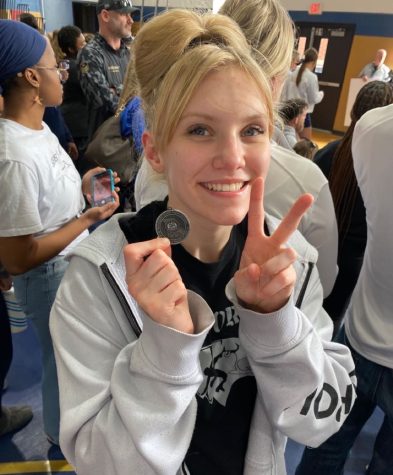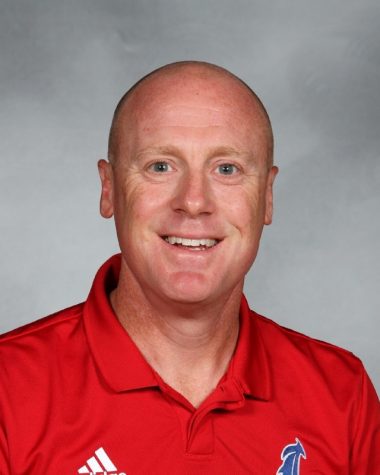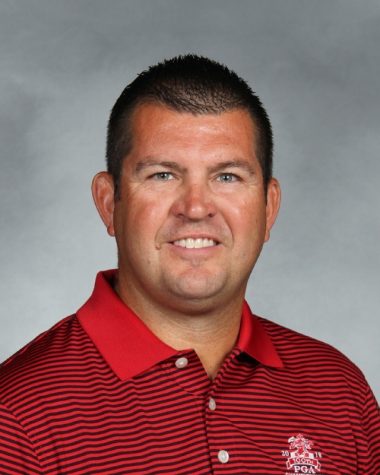The Mental Impact

Annalisa Kercher (senior)
Annalisa Kercher has been pit against society’s standards since childhood.
“I’m not the image you would think of when you think of beautiful, stereotypically,” Kercher said.
Kercher, now a senior, recalls a time when she fully loved the way she looked, but it was quickly hampered. Kercher was bullied from the time she was five. Other kids seemed to hate every aspect of her appearance, from her weight to her hair to her fingernails.
“It got to the point that when teachers would ask ‘what’s your favorite thing about your appearance,’ I would say my ears,” Kercher said. “That was the only thing you couldn’t really judge me on.”
As she grew up, this eventually manifested into an eating disorder. Kercher alternated between eating less than 300 calories a day and binging to a point in which her body couldn’t comprehend how much she was consuming. Her illness took a physical and mental toll; Kercher developed iron and vitamin deficiencies and lost all of her energy, causing her to have fainting spells at the disorder’s peak.
“I’m not the image you would think of when you think of beautiful. — Annalisa Kercher
Though Kercher is doing better today, the past continues to follow her.
“It goes up and down. Literally a week ago I had to cover up my mirrors so I couldn’t see myself,” Kercher said. “Nothing could have me in it because I was so disgusted by what I saw.”
One of Liberty’s brightest varsity athletes, who would prefer to be kept anonymous, also became self-conscious about her body as a child. As a former gymnast, she was surrounded by an unspoken association of performance with lightness, one that often favored girls who were young and undeveloped.
“[Gymnastics is] a sport where historically the tiny and childlike bodies are ideal and promoted,” she said. “When my body started changing I tried to fight it in hopes of looking like my younger teammates.”
Her instinctive comparison carried over as she moved on to other sports. In order to “keep up” she excessively exercised every night when no one would know. As she became more obsessed, she began limiting her calorie intake.
“My big thing was control and perfection. No matter what triggered the episode, no matter the circumstance, it all boiled down to me needing control,” she said. “It started by me controlling my behaviors. It ended with my behaviors controlling me.”
When she began losing weight, her peers noticed – some not for the right reasons. Instead of receiving concern, she was complimented. Instead of trying to get her help when they noticed her behaviors, they ridiculed her for “cheating”.
Her experience exemplifies the growing danger of health and beauty standards. People associate skinny with pretty and therefore healthy, sometimes developing petty jealousy but rarely taking the time to consider what is actually happening to a person. They leave people like the athlete in the dark for far too long.
“I was living in denial for a while. I hid and manipulated everyone so I could continue these self destructive behaviors. One of those people was myself. I would minimize the problem. I would say I was doing it for good reasons and that nothing bad could happen,” she said. “Once I started to accept that I had a disease it was hard, [but because of that] I turned to others struggling with similar things.”
While eating disorders tell you you’re alone, there are people around you willing to do everything they can to see you get better and happier. .Finding support from friends and others who shared her struggles, the athlete gained the courage to go into recovery. Though every day is still a battle, she is grateful to be out of the dark place she was in.
“I hid [my disorder] for almost four years and it almost killed me,” she said. “There are so many people out there with low self-esteem, poor body image and struggles surrounding control. It’s important to show them compassion and care, to not write off their problems and just assume they’re okay.”
Teenagers are beginning to realize that the pressure placed upon them is unfair and unattainable. With bravery, they work hard to actively combat these thoughts everyday.










